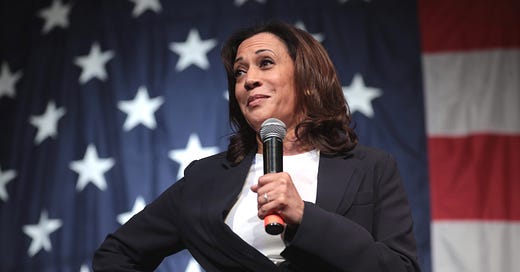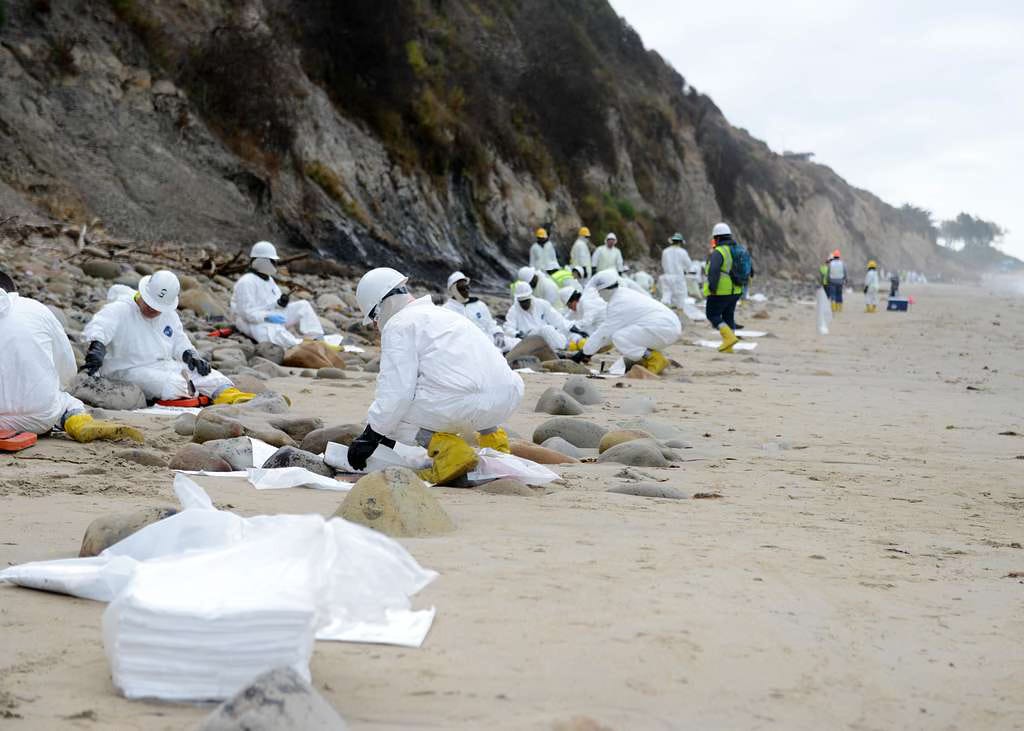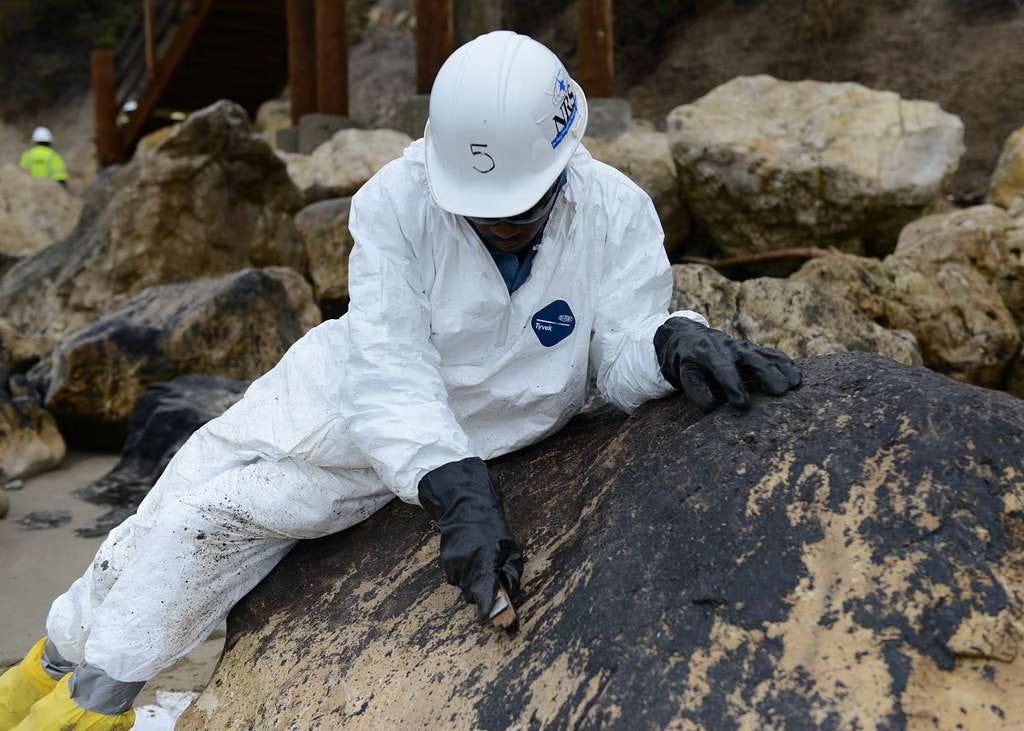Kamala Harris took on fossil fuel companies in California. Might she sue Big Oil as president?
Sen. Sheldon Whitehouse tells Landmark a DOJ investigation could force "the industry to stop lying and make corrective statements about its past lying."

Eight years ago, a group of 17 attorneys general including one Kamala Harris of California came together to declare the need for urgent legal action to hold Big Oil accountable for its role in causing climate change.
The coordinated effort, called a turning point by Al Gore, focused on what were at the time novel and wholly untested theories of legal liability for major oil and gas companies.
The year before, investigations had unearthed documents showing the fossil fuel industry had lied to the public and investors about the danger of its products for decades, leading to costly rising seas and floods, increased wildfire risk and more ferocious storms. The attorneys general figured the industry should be forced to reckon with that deception in court.
“Climate change has real and lasting impacts on our environment, public health and the economy,” Harris said at the time. “I am proud to join this effort to preserve and protect our natural resources for future generations to come.”
After formally accepting the Democratic presidential nomination last week, Harris could soon be in a position to take that idea to hold Big Oil accountable to the national stage. If she does, the investigation would be bolstered by a degree of legal power that goes far beyond what any state attorney general could ever muster.
But the question is, will she delight environmental groups and seize that opportunity to make history? And what would it even mean if she did?
‘It’s about having the conviction to take these guys into court and to hold them accountable, and not backing down’
If voters hoped that presidential candidate Harris would come out swinging on climate during her sprinting 2024 campaign, then this week’s Democratic National Convention did not deliver.
During her acceptance speech on Thursday, Harris made only fleeting reference to climate change. She used the word “climate” just once, framing the election as partly about the “freedom” to breathe clean air, drink clean water and “live free from the pollution that fuels the climate crisis.”
The Democratic Party’s platform meanwhile goes slightly further, but mostly focuses on building on the momentum established during the past four years to build out renewable energy infrastructure to reduce emissions across the economy. Launching a massive federal lawsuit against some of America’s most powerful companies is not one of the bullet points.
“I would say she was more proactive than most.” -Linda Krop, chief counsel for the Environmental Defense Center
Still, Harris has a history of fighting polluting industries in court, according to attorneys and environmental advocates who have worked on environmental issues in California.
Linda Krop, chief counsel for the Environmental Defense Center, told Landmark that, as attorney general, Harris put her weight behind environmental protections in several key fights her group was involved with.
In one, Harris sued the Obama-Biden administration over offshore fracking approvals. Harris also got involved with more local issues by pushing for greater scrutiny of a Valero refinery in San Luis Obispo County, and brought rare criminal charges against Plains All-American Pipeline after the 2015 pipeline spill near Santa Barbara.
“It’s fairly rare for agencies to file criminal complaints in these situations … and the local community was very grateful,” Krop said.
But was she just doing what any AG would in the environmentally-conscious state?
“I would say she was more proactive than most,” Krop said.
For her part, Harris has said explicitly that she would be open to a U.S. Department of Justice investigation into Big Oil. During her short-lived 2020 primary campaign, Harris told Mother Jones the federal department should “absolutely” investigate the industry (but she also advocated for a ban on fracking that year, a position she has since abandoned).
“It’s about having the conviction to take these guys into court and to hold them accountable, and not backing down,” she said.
Using Big Tobacco litigation as a model
The legal movement started in part by that coalition of 17 attorneys general back in 2016 has progressed quite a bit in the past eight years.
There are now dozens of lawsuits that have been filed by states and local municipalities in state courts across the country against major oil companies like Exxon, Chevron and BP seeking climate change damages. The first was filed in 2017 by California’s San Mateo and Marin counties, as well as the city of Imperial Beach. The first state to sue was Rhode Island roughly a year later.
California’s own lawsuit was filed last year by Harris’s successor, Rob Bonta.
But fossil fuel companies have pushed back aggressively, miring the cases in years of procedural and technical delays while arguing climate change is an issue best left for America’s political branches to act upon.
(Donald Trump, Harris’s 2024 opponent, has regularly attacked climate science and sought as much as $1 billion in campaign contributions from fossil fuel company executives this cycle.)
With those delays as a backdrop, Democrats in Congress launched an investigation into the fossil fuel industry several years ago, and formally recommended the DOJ open its own investigation earlier this year.
Democratic Sen. Sheldon Whitehouse of Rhode Island, the chairman of the Senate Budget Committee, told Landmark the investigation uncovered “ample predication for DOJ to launch a fraud investigation into the fossil fuel industry’s decades-long campaign of disinformation and doublespeak.”
“The DOJ victory against Big Tobacco, which forced the industry to stop lying and make corrective statements about its past lying, provides a model for a case against Big Oil,” he said. “Just like Big Tobacco, Big Oil built an enormous covert apparatus to dispense lies, propaganda, fake science, and political pressure, at enormous cost to public health and safety.”
Whitehouse said he has not heard back from the DOJ about the request. A DOJ representative has told Landmark that they received the referral and are considering it.
A climate change warning label at the gas pump?
Should the DOJ launch that investigation, legal experts say the department has a lot more tools at its disposal than Harris would have had when she launched California’s investigation many years ago.
For instance, the DOJ has massive financial and manpower resources at its disposal, which would allow the agency to enforce subpoenas that major companies allegedly ignored when they came from Congress. While it may be somewhat easy to brush off a congressional request, avoiding the FBI may be a tougher task.
Richard Wiles, the president of the Center for Climate Integrity, told Landmark the DOJ’s involvement would undoubtedly mean more evidence coming to light about the industry’s coordinated efforts to undermine climate change science.
“Oh my god, there’s obviously more evidence that we haven’t seen. We don’t even know what it is,” he said. “If you just got all the redacted documents cleared up, I think you’d probably strengthen a hypothetical case pretty enormously.”
Wiles said there are multiple legal theories the DOJ could potentially pursue, including racketeering charges or antitrust charges. Racketeering charges in particular have been recommended by Sharon Eubanks, the former DOJ attorney who prosecuted the case against Big Tobacco.
The Big Tobacco case is informative when considering what a Big Oil investigation could mean. In that case, tobacco companies were ordered by a federal judge in 2006 to stop misrepresenting the danger of cigarettes and run “corrective statements” recognizing those dangers in newspapers, TV ads and on cigarette packages.
And something similar could happen to Big Oil, Wiles said. A judgment against the industry could force it to stop promoting things like natural gas, which the fossil fuel industry has promoted as a green “bridge” fuel that will displace dirtier coal emissions, despite concerns it has a major climate impact as well.
“They could be forced to run advertising saying their products cause climate change,” Wiles said. “It might be a statement on every gas pump in the country.”
“I don’t know exactly how it plays out in the real world, but you’ve got to believe that you’d be in a different world at that point.”







Big Oil reaped huge benefits from the human addiction to energy. Run away profits ad stock prices measured the ill growth of earth’s distemper toward man’s greed.hopefully, climate issues will be a major concern for Harris, even though the issue not front and center during the campaign.